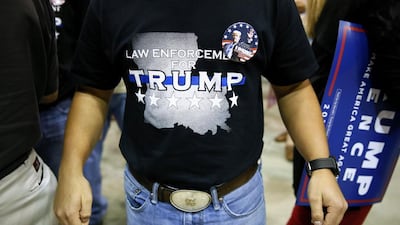It is the question argued and parried and debated at dinner tables up and down the east and west coasts of the United States: what are they thinking? What motivates more than 40 per cent of American voters to support a billionaire real-estate developer and reality-television personality with a paucity of policy ideas and a surfeit of anger-management issues to be president of the United States?
The question, when posed, is often intended to be more rhetorical than interrogatory. Arlie Russell Hochschild, sociologist at University of California, Berkeley, took it literally, and for her insightful new book, Strangers in Their Own Land, she travelled from her liberal Bay Area enclave to conservative Louisiana to understand what motivated local adherents to the Tea Party movement. Trapped in their competing Fox News-New York Times bubbles, Americans increasingly lack the means or the desire to communicate with each other, and Hochschild sets out to offer her services as a translator, reporting to coastal elites on the frame of reference that motivates the populist right.
Hochschild is intent on heightening the contradictions, digging into the anti-government, anti-regulatory impulses of her subjects and uncovering the exposed places where they might benefit from a bit more regulation. Louisiana, home to numerous oil and chemical companies, suffers from rampant pollution, and many of the rural residents she speaks to have endured dire consequences, from illnesses to lost homes, as a result. So why were those same voters intent on supporting candidates who promised to dismantle the federal Environmental Protection Agency?
The Tea Party, Hochschild comes to understand, is a delayed response to the financial crisis of 2008 and the election of Barack Obama as president. Government, its adherents believed, was the problem, and the private sector the solution. That the private sector, improperly regulated, had played a major role in causing the financial crisis, and that the oil and chemical companies were polluting their towns and their waterways because of inadequate oversight, mattered less to Hochschild’s subjects than a desire to leave the free market free to operate. The free market, they believed, brought jobs, and regulation – even regulations that would preserve the natural world that so many Louisianans genuinely loved – would instantly take those jobs away. And polluters, as Hochschild cannily argues, picked places such as Louisiana because its population – conservative, Catholic, mostly lacking college education – made them the least likely to fight back.
State residents resented the intrusion of the federal government on their communities, but as Hochschild wonders, “did a total free-market world and local community go together?” The Louisianans she spoke to were aggravated by the restrictions on their “freedom to” keep more of their taxable income and live unconstrained by government regulation and devoted little thought to their “freedom from” pollution and environmental degradation and gun violence.
Hochschild went to Louisiana in search of what she refers to as the “deep story” of contemporary conservatism, less about the facts than the feeling of partisans’ political allegiances. What is the narrative they tell themselves about their lives, their roles and their hopes for political reform? In so doing, she lays out a sort of origin narrative for the stranger-than-fiction rise of Donald Trump.
Hochschild uncovers a deep story for her subjects, one in which every American stands in an endless, snaking line. At the line’s front, off in the distance, sits the American Dream. Meanwhile, though, an ever-growing array of new arrivals – African-Americans, women, immigrants, union members – were all flagrantly cutting the line. And President Obama, rather than policing the violators, was encouraging them. Where the left was outraged over the malefactors of Wall Street, the right’s umbrage was pointed downward, at the takers of the welfare office, paid for shirking work.
To be a white man was no longer a position of pride, but a point of conflict. “You are a stranger in your own land,” Hochschild notes of her subjects. “You do not recognise yourself in how others see you. It is a struggle to feel seen and honoured. And to feel honoured you have to feel – and feel seen as – moving forward. But through no fault of your own, and in ways that are hidden, you are slipping backward.”
Trump triumphed over 16 Republican rivals by promising to undo all that, to “Make America Great Again”. He tells his supporters that the manufacturing jobs that have fled the country will return once more, that the demon scourge of political correctness will be forever banished, that line-cutting will be abolished. And in his desire to gore so many sacred American cows, from Barack Obama to John McCain to Khizr Khan, Trump allows many of his supporters to believe that the country can write itself an entirely new story that erases the hateful present and restores a quasi-imaginary past of prosperity and order. Trump, the ultimate emotion-heavy candidate, is the answer Hochschild’s subjects had not even been aware they were waiting for.
Trump speaks to the economic uncertainty Hochschild details, the willing embrace of the slimy tentacles of the corporate octopus, out of fear that anything less will mean another vanished job. It is the equivalent of voting for your jerk boss in the hopes that he might select you for a promotion.
Hochschild is admirably even-handed, perpetually seeking to climb over the walls of her gilded Berkeley cage and understand life on the other side. Strangers in Their Own Land is well-reported and emotionally astute. It creates a pinhole through which coastal elites can see into the lives of their ideological opposites. Hochschild is intent on crafting a fully rounded portrait of these servants of unchecked capitalism. But well-meaning people can still cause incalculable damage to the American body politic. Just how much will be determined in early November.
Saul Austerlitz is a regular contributor to The Review.

